5 start with K start with K
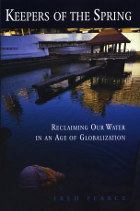
Water has long been the object of political ambition and conflict. Recent history is full of leaders who tried to harness water to realize national dreams. Yet the people who most need water-farmers, rural villages, impoverished communities-are too often left, paradoxically, with desiccated fields, unfulfilled promises, and refugee status.
It doesn't have to be this way, according to Fred Pearce. A veteran science news correspondent, Pearce has for over fifteen years chronicled the development of large-scale water projects like China's vast Three Gorges dam and India's Sardar Sarovar. But, as he and numerous other authors have pointed out, far from solving our water problems, these industrial scale projects, and others now in the planning, are bringing us to the brink of a global water crisis.
Pearce decided there had to be a better way.
To find it, he traveled the globe in search of alternatives to mega-engineering projects. In Keepers of the Spring, he brings back intriguing stories from people like Yannis Mitsis, an ethnic Greek Cypriot, who is the last in his line to know the ways and whereabouts of a network of underground tunnels that have for centuries delivered to farming communities the water they need to survive on an arid landscape. He recounts the inspiring experiences of small-scale water stewards like Kenyan Jane Ngei, who reclaimed for her people a land abandoned by her government as a wasteland. And he tells of many others who are developing new techniques and rediscovering ancient ones to capture water for themselves.
In so doing, Pearce documents that these "keepers" are not merely isolated examples, but collectively constitute an entire alternative tradition of working with natural flows rather than trying to reengineer nature to provide water for human needs.
The solution to our water problems, he finds, may not lie in new technologies-though they will play a role-but in recovering ancient traditions, using water more efficiently, and better understanding local hydrology. Are these approaches adequate to serve the world's growing populations? The answer remains unclear. But we ignore them at our own peril.
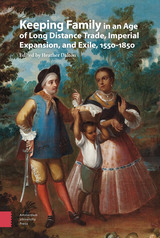
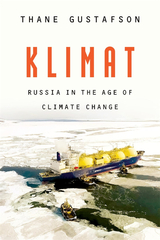
A discerning analysis of the future effects of climate change on Russia, the major power most dependent on the fossil fuel economy.
Russia will be one of the countries most affected by climate change. No major power is more economically dependent on the export of hydrocarbons; at the same time, two-thirds of Russia’s territory lies in the arctic north, where melting permafrost is already imposing growing damage. Climate change also brings drought and floods to Russia’s south, threatening the country’s agricultural exports.
Thane Gustafson predicts that, over the next thirty years, climate change will leave a dramatic imprint on Russia. The decline of fossil fuel use is already underway, and restrictions on hydrocarbons will only tighten, cutting fuel prices and slashing Russia’s export revenues. Yet Russia has no substitutes for oil and gas revenues. The country is unprepared for the worldwide transition to renewable energy, as Russian leaders continue to invest the national wealth in oil and gas while dismissing the promise of post-carbon technologies. Nor has the state made efforts to offset the direct damage that climate change will do inside the country. Optimists point to new opportunities—higher temperatures could increase agricultural yields, the melting of arctic ice may open year-round shipping lanes in the far north, and Russia could become a global nuclear-energy supplier. But the eventual post-Putin generation of Russian leaders will nonetheless face enormous handicaps, as their country finds itself weaker than at any time in the preceding century.
Lucid and thought-provoking, Klimat shows how climate change is poised to alter the global order, potentially toppling even great powers from their perches.
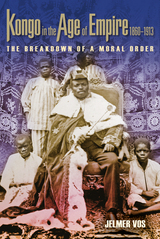
Vos underlines that Kongo's incorporation in the European state system also had tragic consequences, including the undermining of local African structures of authority—on which the colonial system actually depended. Kongo in the Age of Empire carefully documents the involvement of Kongo's royal court in the exercise of Portuguese rule in northern Angola and the ways that Kongo citizens experienced colonial rule as an increasingly illegitimate extension of royal power.
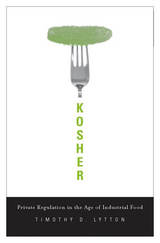
Generating over $12 billion in annual sales, kosher food is big business. It is also an unheralded story of successful private-sector regulation in an era of growing public concern over the government’s ability to ensure food safety. Kosher uncovers how independent certification agencies rescued American kosher supervision from fraud and corruption and turned it into a model of nongovernmental administration.
Currently, a network of over three hundred private certifiers ensures the kosher status of food for over twelve million Americans, of whom only eight percent are religious Jews. But the system was not always so reliable. At the turn of the twentieth century, kosher meat production in the United States was notorious for scandals involving price-fixing, racketeering, and even murder. Reform finally came with the rise of independent kosher certification agencies which established uniform industry standards, rigorous professional training, and institutional checks and balances to prevent mistakes and misconduct.
In overcoming many of the problems of insufficient resources and weak enforcement that hamper the government, private kosher certification holds important lessons for improving food regulation, Timothy Lytton argues. He views the popularity of kosher food as a response to a more general cultural anxiety about industrialization of the food supply. Like organic and locavore enthusiasts, a growing number of consumers see in rabbinic supervision a way to personalize today’s vastly complex, globalized system of food production.
READERS
Browse our collection.
PUBLISHERS
See BiblioVault's publisher services.
STUDENT SERVICES
Files for college accessibility offices.
UChicago Accessibility Resources
home | accessibility | search | about | contact us
BiblioVault ® 2001 - 2024
The University of Chicago Press









